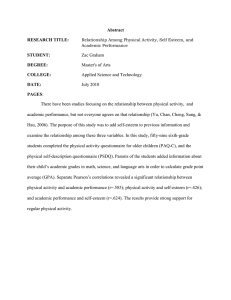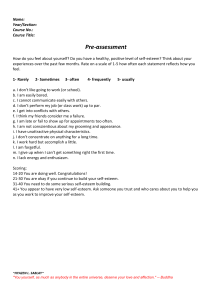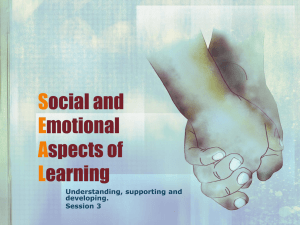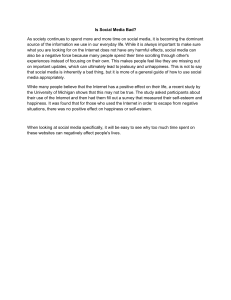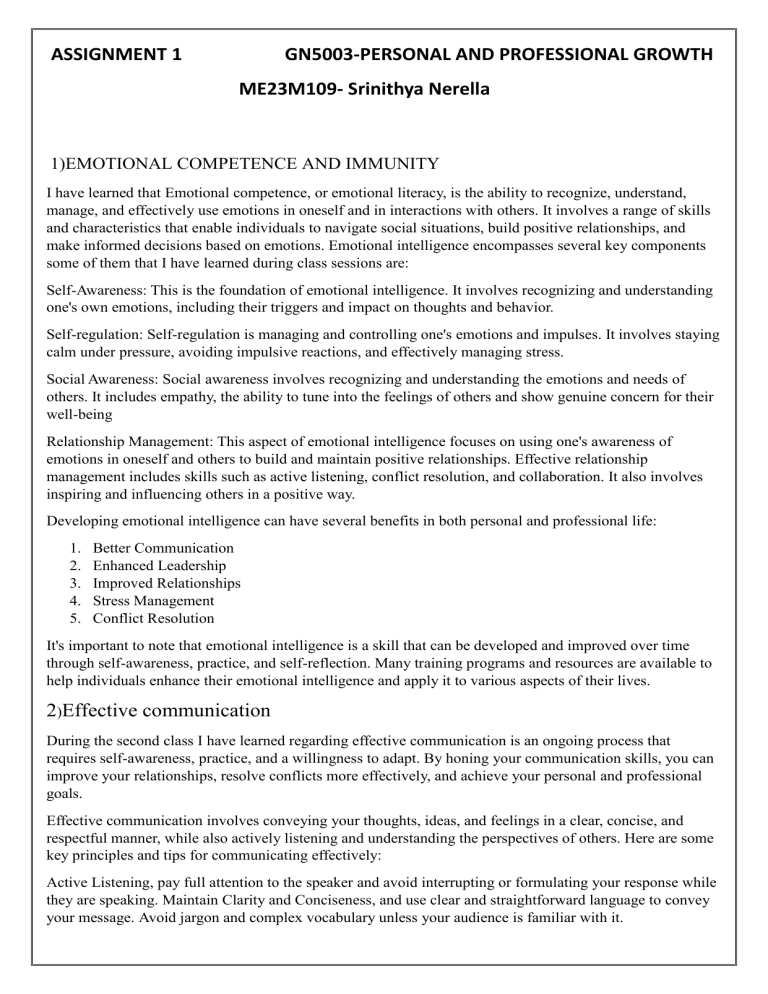
ASSIGNMENT 1 GN5003-PERSONAL AND PROFESSIONAL GROWTH ME23M109- Srinithya Nerella 1)EMOTIONAL COMPETENCE AND IMMUNITY I have learned that Emotional competence, or emotional literacy, is the ability to recognize, understand, manage, and effectively use emotions in oneself and in interactions with others. It involves a range of skills and characteristics that enable individuals to navigate social situations, build positive relationships, and make informed decisions based on emotions. Emotional intelligence encompasses several key components some of them that I have learned during class sessions are: Self-Awareness: This is the foundation of emotional intelligence. It involves recognizing and understanding one's own emotions, including their triggers and impact on thoughts and behavior. Self-regulation: Self-regulation is managing and controlling one's emotions and impulses. It involves staying calm under pressure, avoiding impulsive reactions, and effectively managing stress. Social Awareness: Social awareness involves recognizing and understanding the emotions and needs of others. It includes empathy, the ability to tune into the feelings of others and show genuine concern for their well-being Relationship Management: This aspect of emotional intelligence focuses on using one's awareness of emotions in oneself and others to build and maintain positive relationships. Effective relationship management includes skills such as active listening, conflict resolution, and collaboration. It also involves inspiring and influencing others in a positive way. Developing emotional intelligence can have several benefits in both personal and professional life: 1. 2. 3. 4. 5. Better Communication Enhanced Leadership Improved Relationships Stress Management Conflict Resolution It's important to note that emotional intelligence is a skill that can be developed and improved over time through self-awareness, practice, and self-reflection. Many training programs and resources are available to help individuals enhance their emotional intelligence and apply it to various aspects of their lives. 2)Effective communication During the second class I have learned regarding effective communication is an ongoing process that requires self-awareness, practice, and a willingness to adapt. By honing your communication skills, you can improve your relationships, resolve conflicts more effectively, and achieve your personal and professional goals. Effective communication involves conveying your thoughts, ideas, and feelings in a clear, concise, and respectful manner, while also actively listening and understanding the perspectives of others. Here are some key principles and tips for communicating effectively: Active Listening, pay full attention to the speaker and avoid interrupting or formulating your response while they are speaking. Maintain Clarity and Conciseness, and use clear and straightforward language to convey your message. Avoid jargon and complex vocabulary unless your audience is familiar with it. Be aware of your body language, facial expressions, and tone of voice. Ensure your nonverbal cues align with your spoken words. Empathy and Understanding, Effective Feedback, Timing and Context, Use of Technology, Stay Calm and Respectful, Practice and Seek Feedback. 3)SELF ESTEEM For me, the word Self-esteem refers to a person's overall evaluation or perception of their worth and value. It is the judgment or attitude one holds toward oneself, encompassing feelings of self-worth, self-acceptance, and self-respect. Self-esteem plays a significant role in shaping a person's thoughts, emotions, and behaviors, and it can profoundly impact their overall well-being and life experiences. Here are some key aspects and characteristics of self-esteem that we learned during class session : Self-Worth: Self-esteem reflects the belief that one is deserving of love, respect, and happiness. SelfAcceptance: It means acknowledging imperfections and still feeling valuable and worthy. Self-Respect: People with healthy self-esteem treat themselves with respect and kindness. Self-Confidence: Confidence in one's abilities and decisions often stems from a strong sense of self-worth. Self-Efficacy: This is the belief in one's ability to accomplish tasks and achieve goals. Impact on Mental Health: Low self-esteem is associated with mental health issues such as depression, anxiety, and low self-confidence. Conversely, high self-esteem can contribute to better emotional well-being. Influence on Relationships: Self-esteem can affect the quality of interpersonal relationships. Development and Change: Self-esteem can evolve over time and change based on life experiences, feedback from others, and personal growth efforts. Improving self-esteem often involves self-reflection, self-compassion, and self-improvement efforts. Here are some strategies for boosting self-esteem: Practice self-acceptance and self-compassion, Challenge and reframe negative self-talk and beliefs, Set achievable goals and celebrate your accomplishments, Surround yourself with supportive and positive people, and Seek professional help if self-esteem issues are severe or persistent. Remember that self-esteem is not a fixed trait, and with effort and self-awareness, it can be nurtured and improved over time. Building healthy self-esteem is an essential component of personal growth and wellbeing. 4)BECOMING A PROFESSIONALISM For me, professionalism is an ongoing journey, and it may require continuous self-reflection and improvement. It is not solely about how you present yourself externally but also about your values, ethics, and contributions to your field. By embodying these principles and consistently demonstrating professionalism, you can enhance your career prospects and contribute positively to your workplace and industry. By Communicating clearly and professionally, whether in written or spoken form. Listen actively and respectfully to colleagues and clients, and respond thoughtfully. Respect for Others, Treating all individuals, regardless of their position or background, with respect and courtesy. Avoid discriminatory or offensive language or behavior. Maintain Integrity to Uphold ethical standards and principles in all your professional interactions. Be honest and transparent in your dealings, and avoid conflicts of interest. Continuous Learning by Stay updated on industry trends, best practices, and relevant skills. Seek opportunities for professional development and further education. Adaptability and Flexibility by Being open to change and adaptable in response to evolving circumstances. Approach challenges with a problem-solving mindset. Teamwork and Collaboration by Working effectively with colleagues and contribute positively to team dynamics. Recognize and value the strengths and perspectives of others. Manage your time efficiently to meet deadlines and prioritize tasks effectively. Avoid procrastination and focus on productivity. Conflict Resolution by Develop skills for resolving conflicts in a constructive and respectful manner. Seek solutions that are fair and mutually beneficial. Improving Networking by Building professional relationships with colleagues, mentors, and others in your field. Attend industry events and participate in networking opportunities. Improving Cultural Sensitivity by Being aware of and respectful toward diverse cultural backgrounds and perspectives. Improving Leadership Qualities by Displaying leadership qualities, even if you're not in a formal leadership role. Inspire and motivate others through your actions and work ethic. Continuously assess and improve your professional skills and competencies. Professional Development by Investing in your professional growth through workshops, courses, certifications, and conferences. 5)TIME MANAGEMENT Time management is the process of planning, organizing, and prioritizing your tasks and activities to make the most effective use of your time. Effective time management can help you become more productive, reduce stress, and achieve your goals efficiently. Here are some key principles and strategies for improving your time management skills: Set Clear Goals, Define your short-term and long-term goals. Knowing what you want to achieve will help you prioritize your tasks. urgent and important, important but not urgent, urgent but not important, and neither urgent nor important. Focus on the most important tasks first. Create a To-Do List, Make a daily or weekly to-do list that outlines the tasks you need to complete. This helps you visualize your workload. Set Specific Deadlines, and assign deadlines to your tasks to create a sense of urgency and accountability. Avoid Multitasking, instead of multitasking, concentrate on one task at a time. It's more efficient and reduces errors. Eliminate Time Wasters, identify common time-wasting activities (e.g., excessive social media, and unnecessary meetings), and minimize or eliminate them from your schedule. Learn to Say No, Don't overcommit yourself. Politely decline requests or tasks that don't align with your goals or priorities. Delegate Tasks, If possible, delegate tasks to others. Delegation frees up your time for higher-priority responsibilities. Use Technology Wisely: Utilize productivity apps, calendars, and task management tools to stay organized and set reminders. Take Regular Breaks, Short breaks between tasks can boost productivity and help maintain focus, Review and Reflect, Learn from Your Mistakes, Practice Time Management Techniques, Maintain Work-Life Balance, Allocate time for personal activities, relaxation, and spending time with loved ones to maintain a healthy work-life balance.

